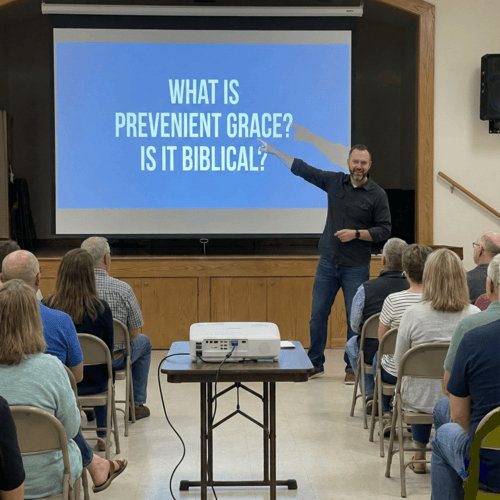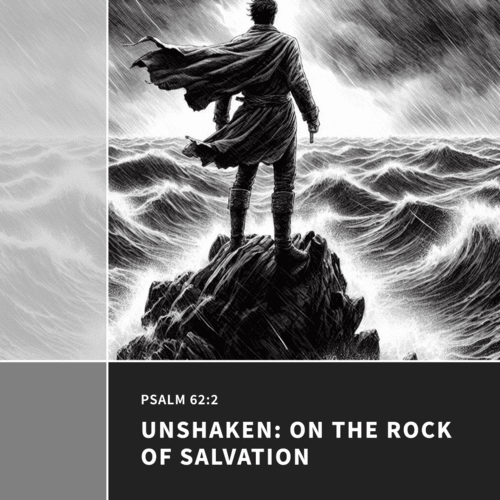Assurance of Salvation: Can I Really Know I’m Saved?
Assurance of Salvation: The Believer’s Anchor in the Storms of Life
Imagine we each possess a treasure so precious it transforms every aspect of our lives. Well, this treasure is no myth or distant dream, but the experience of every believer in Christ. It’s ASSURANCE OF SALVATION—a gift unique to Christianity, and one that believers often overlook. And even undervalue.
As followers of Christ, we’ve been granted an unparalleled blessing: the unwavering confidence that we’re accepted by God, both now and for eternity. This divine guarantee—our assurance of salvation—isn’t just another religious claim; it’s a radically life-altering reality that sets our faith apart in the vast sea of world religions.
The Passover Parable: Faith in the Lamb
Picture two Jewish neighbours on the eve of the first Passover. Both have obediently applied the lamb’s blood to their doorposts as instructed by God. However, while one bubbles over with excitement, eager to see how God will accomplish what He has promised, the other is gripped by doubt. “I fear God won’t spare my home,” he frets, “even though I’ve done as He said.” Well, who do you think God spared that night? Both men—because their salvation depended not on the strength of their faith, but on the sufficiency of the sacrificial lamb.
This illustration captures the very essence of our assurance in Christ. Our salvation rests not on our wavering emotions or imperfect obedience, but on the finished work of Jesus, our perfect Lamb. He is the Rock of our Salvation (Psalm 62:2).
Biblical Foundations of Assurance
The promise of assurance echoes throughout Scripture, transcending theological debates. Whether we lean towards Calvinism or Arminianism, the Bible consistently encourages us to seek and expect assurance of our salvation. Jesus Himself offers powerful words of assurance in John’s Gospel (John 5:24, 6:47, 10:27-29). Paul further reinforces this assurance with his triumphant assurance in Romans 8:38-39.
A particularly significant passage to consider is Hebrews 6:17-19. Here, the author describes God’s promise and oath as “two unchangeable things, in which it is impossible for God to lie.” This divine guarantee is said to be “a sure and steadfast anchor of the soul.” This metaphor of an anchor vividly illustrates how our assurance is not based on our own efforts or feelings, but on the immutable character and promises of God Himself.
These passages, among others, indicate assurance of salvation is not a peripheral issue in Scripture, but a central aspect of the believer’s experience. They invite us to rest in the finished work of Christ and the unchanging promises of God, and thus provide a firm foundation for our faith regardless of our specific theological leanings.
But how can we be certain our faith is genuine?
John’s Spiritual Health Check
The apostle John, in his first epistle, provides a spiritual health check—a series of tests to confirm the reality of our faith. He says, “I write these things to you who believe in the name of the Son of God that you may know that you have eternal life” (1 John 5:13). These ten tests aren’t meant to induce anxiety, but to provide reassurance. They ask:
- Am I enjoying fellowship with Christ and the Father? (1 John 1:2-3)
- Do I see a decreasing pattern of sin in my life? (1 John 1:5-10; 1 John 3:4-10)
- Do I enjoy and obey God’s Word? (1 John 2:3)
- Am I growing in Christlikeness? (1 John 2:3-6)
- Is the world becoming increasingly distasteful to me? (1 John 2:15)
- Do I eagerly look forward to Christ’s return? (1 John 3:2-3)
- Do I love God and His people in an increasing measure? (1 John 3:16-18; 23)
- Am I seeing the fruit of the Holy Spirit manifesting in my life? (1 John 4:13-14)
- Am I increasingly able to discern between spiritual truth and error? (1 John 2:20-27, 1 John 4:13, Romans 8:16)
- Do I feel compelled to profess faith openly and hold fast to sound doctrine? (1 John 4:15)
These tests aren’t about achieving sinless perfection. Rather, they’re about discerning the trajectory and the direction of our lives. In short, are we, by God’s grace, becoming more like Christ?
Navigating Doubts: The Unbreakable Cord of Assurance
Yet, despite these assurances, doubts may still assail us. In such moments, we’d do well to anchor ourselves to the objective truth of God’s promises rather than our fickle feelings.
We rest in the unbreakable covenant of a God who cannot lie, in the all-sufficient sacrifice of Christ, and in the inward witness of the Holy Spirit.
This triple-braided cord of assurance—God’s character, Christ’s work, and the Spirit’s testimony—is unbreakable. It’s the wind in our sails, propelling us forward in our spiritual journey.
The Transformative Power of Assurance
Our assurance of salvation infuses our lives with profound peace, boundless joy, and unyielding strength, even in the face of life’s fiercest storms. As we navigate this wilderness journey, it becomes our compass, guiding us with a sense of purpose and security found nowhere else. It equips us to face trials and temptations with unwavering hope, knowing perfect love casts out all fear.
Assurance of Salvation: A Gift the World Cannot Fathom
The world knows nothing of this gift and cannot fathom what it’s missing. But for us, this assurance adds vibrant colour to the canvas of life, imbuing every moment with meaning and purpose, regardless of our circumstances.
Remember the Hymn, Blessed Assurance?
So, friend, let us embrace and celebrate this blessed assurance. Let it be the song of our hearts, the strength in our steps, and the subject of our gratitude each time we kneel down to pray. For in our assurance of salvation, we find not just the promise of eternal life, but the fullness of life here and now—a life lived in the unshakeable confidence of God’s love and acceptance.
Related Reads
Editor's Pick

Prevenient Grace: 5 Reasons the Doctrine Fails
Can a spiritually dead person choose God? It’s one of the oldest questions in Christian theology. And how we answer [...]

Why Do People Hate the Doctrine of Election?
…WHEN THEY REALLY SHOULDN’T Few Bible doctrines provoke stronger reactions than election. The idea that God chose some for salvation [...]

The Doctrine of Providence: Does God Really Govern All Things?
You’re sitting in the doctor’s office when the diagnosis lands like a thunderclap. Your mind races: Why this? Why now? [...]
SUPPORT US:
Feel the Holy Spirit's gentle nudge to partner with us?
Donate Online:
Account Name: TRUTHS TO DIE FOR FOUNDATION
Account Number: 10243565459
Bank IFSC: IDFB0043391
Bank Name: IDFC FIRST BANK






